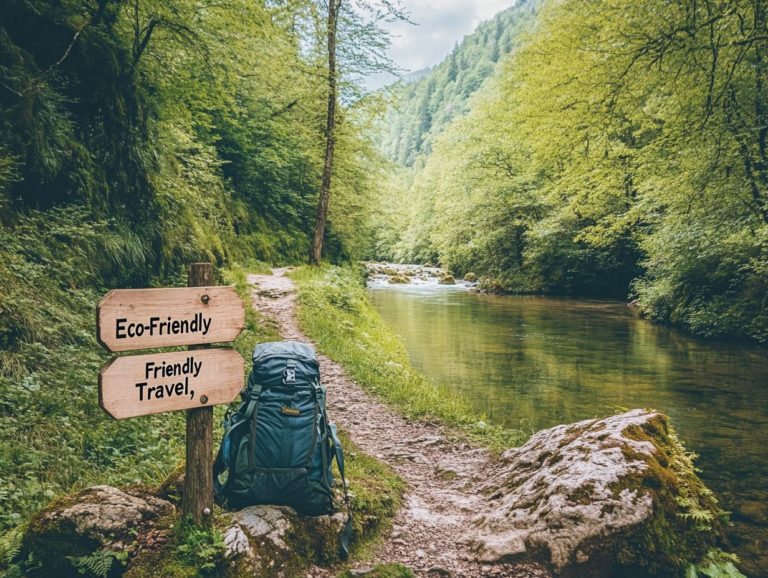Exploring Ethical Animal Encounters on Trips
In an increasingly interconnected world, your travel choices hold the power to profoundly impact the lives of animals and their habitats. This is especially true when it comes to ethical animal tourism and wildlife encounters.
Engaging in ethical animal encounters enhances your experiences. It also promotes animal welfare and conservation. This article delves into the significance of responsible tourism, offering insights into the nuances of animal welfare. We spotlight various forms of ethical interactions, particularly for animal lovers seeking meaningful experiences.
You ll learn to recognize unethical practices and uncover tips for embracing responsible tourism. Dive in and discover how your travel choices can spark real change! This includes participation in conservation efforts that protect local wildlife and create a positive impact on the world around you.
Contents
- Key Takeaways:
- The Importance of Ethical Animal Encounters
- Understanding Animal Welfare
- Types of Ethical Animal Encounters
- How to Identify and Avoid Unethical Animal Encounters
- Tips for Participating in Ethical Animal Encounters
- Frequently Asked Questions
- What are the ethical concerns when encountering local wildlife on trips?
- How can I ensure that my animal encounters on trips are ethical?
- What are some red flags to watch out for in unethical animal encounters?
- Are there any positive ways to interact with animals on trips?
- What should I do if I witness or suspect an unethical animal encounter during my safari in Tanzania?
- Can I still have meaningful and memorable experiences with animals on trips without participating in unethical encounters?
Key Takeaways:

- Responsible tourism is crucial for ethical animal encounters. It promotes the protection and well-being of animals, including endangered species like elephants and sloths.
- Understanding animal welfare is essential in evaluating the ethics of animal encounters. It involves considering the physical and psychological needs of animals.
- To ensure ethical animal encounters, identify and avoid red flags. Follow best practices, such as choosing reputable tour operators like the David Sheldrick Wildlife Trust for elephant orphanage visits. Avoid activities that exploit animals for entertainment.
The Importance of Ethical Animal Encounters
Ethical animal encounters are essential for promoting responsible tourism and protecting local wildlife. They enable you to connect with nature while honoring the well-being of the animals involved.
By prioritizing conservation efforts and ethical travel practices, you can actively contribute to environmental conservation efforts while indulging in unforgettable wildlife experiences.
These encounters deepen your understanding of animal welfare and shed light on the exploitation of animals within the tourism industry. They ensure that the emphasis stays on preserving these magnificent creatures and their natural habitats.
Why Responsible Tourism Matters
Responsible tourism is crucial for promoting sustainable practices. It safeguards local wildlife and cultural heritage while providing enriching experiences for you as a traveler.
By prioritizing ethical travel choices, you can significantly lessen your impact on fragile ecosystems. This ensures that the communities you visit reap the benefits of tourism. This mindful approach invites you to support local businesses and engage in activities that honor traditional customs and environments.
You have the power to play a pivotal role in reducing exploitation within the industry. Educate yourself about the destinations you explore, choose eco-friendly accommodations, and get involved in conservation efforts.
Ultimately, responsible tourism preserves the beauty of our planet. It also enriches the lives of those who call these remarkable places home.
Understanding Animal Welfare
Understanding animal welfare ensures that ethical animal tourism respects the well-being of animals. This approach promotes their health and natural behaviors. It encompasses several principles, notably the Five Freedoms, which provide a framework for the humane treatment and care of animals.
The Five Freedoms are basic rights that ensure animals are treated humanely. They emphasize the significance of both physical and mental well-being, guiding ethical travel practices that prioritize respect and compassion for local wildlife.
By embracing these principles, you contribute to a more humane and responsible approach to animal tourism.
Defining and Evaluating Animal Welfare

Defining and evaluating animal welfare is essential for understanding the ethical implications of animal encounters in tourism. This involves a detailed examination of various indicators that reflect the well-being of animals, such as their natural behaviors, living conditions, and any signs of distress.
Key measures to consider include the availability of space, opportunities for socialization, and access to proper nutrition. These serve as crucial benchmarks for assessing welfare.
Ethical travel practices are pivotal in advocating for improved treatment of animals. Choose responsible tours that prioritize wildlife welfare.
By fostering awareness and education, ethical travel can significantly reduce the exploitation of animals in tourism, leading to more caring and responsible interactions.
Types of Ethical Animal Encounters
Ethical animal encounters present a diverse array of experiences. Each is designed to prioritize animal welfare while enabling you to connect with local wildlife responsibly.
Engage with baby elephants at the David Sheldrick Wildlife Trust in Kenya or observe minke whales gracefully navigating their natural habitat. These interactions not only enrich your understanding but also support essential conservation efforts.
Whether you find yourself on a thrilling safari in Tanzania or visiting the Jaguar Rescue Center in Costa Rica, these ethical animal encounters offer unforgettable experiences that positively impact the ecosystems you engage with. Don’t miss the chance to enjoy wildlife responsibly! Your actions can make a difference!
Examples of Responsible Animal Interactions
Responsible animal interactions are crucial for ensuring that both you and the animals gain from your experiences. Various programs such as the Deep Sea Divers Den perfectly embody this principle.
For example, when you volunteer at the David Sheldrick Wildlife Trust, you re not just helping rehabilitate orphaned elephants; you re also immersing yourself in the critical challenges facing wildlife in Kenya.
Participating in whale watching tours allows you to marvel at these magnificent creatures in their natural habitats while contributing to conservation efforts aimed at protecting marine ecosystems.
You can also explore unique experiences with sloths at the Jaguar Rescue Center, where you ll learn about their rehabilitation and the importance of preserving their habitats. These meaningful encounters cultivate a deeper connection to wildlife and promote ethical tourism, ensuring that both animals and local communities flourish.
How to Identify and Avoid Unethical Animal Encounters
Identifying and avoiding unethical animal encounters is essential for you as a responsible traveler who seeks to engage in practices that do not contribute to the exploitation of wildlife. Remain vigilant for various red flags and warning signs that indicate an unethical experience, such as poor living conditions for animals, a lack of transparency in operations, and interactions that prioritize profit over welfare.
By educating yourself on these critical aspects, you can make informed decisions that align your experiences with the highest ethical tourism standards.
Red Flags and Warning Signs

Recognizing red flags and warning signs is crucial for steering clear of unethical encounters that exploit animals masquerading as tourism.
By being vigilant about aggressive marketing tactics, you may find yourself drawn into facilities that prioritize profit over animal welfare. For instance, those overly enthusiastic promotions touting ‘up-close‘ experiences often signal a troubling disregard for ethical standards.
Observing staff qualifications is equally important. Staff without training might lack the expertise needed to care for animals properly, which can compromise their well-being.
Watch for unnatural animal behaviors, like pacing or excessive vocalizations. These can indicate stress or mistreatment.
Together, these indicators remind us that genuine ethical tourism should always prioritize the safety and dignity of animal inhabitants over mere spectacle.
Tips for Participating in Ethical Animal Encounters
Engaging in ethical animal encounters can elevate your travel experiences while fostering a positive impact on wildlife and their natural habitats. By embracing best practices for responsible tourism, you can join the movement towards responsible travel!
This entails conducting thorough research, selecting reputable organizations, and prioritizing experiences that champion animal welfare and environmental sustainability.
Best Practices for Responsible Tourism
Implementing best practices for responsible tourism is essential for ensuring that ethical animal encounters benefit both wildlife and travelers.
By prioritizing sustainable practices, you can savor authentic experiences while actively supporting the communities dedicated to protecting natural environments.
Engaging with local conservation initiatives not only safeguards habitats but also enables local populations, creating a win-win situation for everyone involved.
Opting for wildlife experiences that adhere to ethical standards minimizes your impact on ecosystems and promotes the well-being of animals. It’s crucial for you to educate yourself about the flora and fauna of your destination, respecting wildlife habitats by keeping a safe distance and adhering to guidelines set by reputable tour operators.
Make thoughtful choices today, and you’ll feel proud of your role in protecting wildlife!
Frequently Asked Questions
What are the ethical concerns when encountering local wildlife on trips?

Some potential ethical concerns include disturbing the natural behavior of animals, causing harm or stress to the animals, and contributing to the exploitation of wildlife for tourism purposes.
How can I ensure that my animal encounters on trips are ethical?
Research the company or organization offering the animal encounter to ensure they have ethical practices, prioritize observation and respect over interaction, and choose activities that allow animals to remain in their natural habitat, such as visiting an elephant orphanage or the David Sheldrick Wildlife Trust.
What are some red flags to watch out for in unethical animal encounters?
Signs of unethical animal encounters may include animals being kept in small, confined spaces, being forced to perform tricks or behaviors, or being drugged or physically altered for the sake of tourism.
Are there any positive ways to interact with animals on trips?
Yes, there are ethical ways to interact with animals on trips, such as volunteering at animal sanctuaries like the Jaguar Rescue Center in Costa Rica, participating in responsibly managed wildlife conservation programs, and observing animals like sloths in their natural habitats from a respectful distance.
What should I do if I witness or suspect an unethical animal encounter during my safari in Tanzania?
If you see or suspect an unethical animal encounter, report it to local authorities or the organization hosting the activity.
You can also choose to opt out of the activity and inform others about why ethical animal interactions matter.
Can I still have meaningful and memorable experiences with animals on trips without participating in unethical encounters?
Yes! You can have amazing experiences with animals by observing them in their natural habitats while ensuring their safety and comfort.
Explore ethical animal sanctuaries like Rainbow Springs Nature Park or engage in responsible wildlife viewing projects, such as the Minke Whale Project.
Support conservation efforts at places like the Great Barrier Reef or get involved with organizations like Sunny Safaris in Kenya.
These options allow you to enjoy nature responsibly and create lasting memories!






